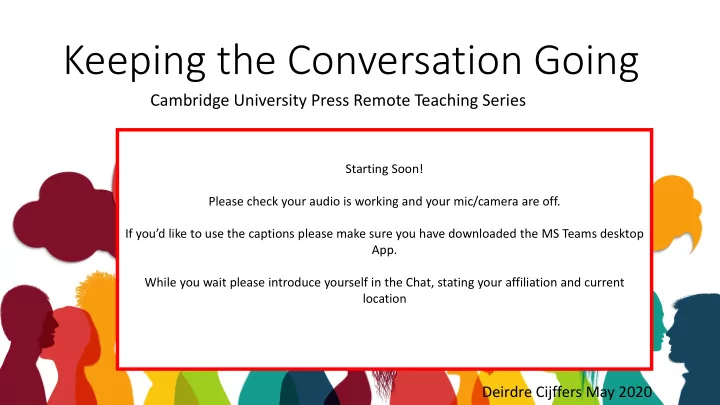

Keeping the Conversation Going Cambridge University Press Remote Teaching Series Starting Soon! Please check your audio is working and your mic/camera are off. If you’d like to use the captions please make sure you have downloaded the MS Teams desktop App. While you wait please introduce yourself in the Chat, stating your affiliation and current location Deirdre Cijffers May 2020
Keeping the Conversation Going Cambridge University Press Remote Teaching Series Deirdre Cijffers May 2020
Quick Recap Lecture Seminar Assignment Discursive review Content Content and extension Experience Activity Feedback
Aims Managing a single whole group discussion Breakouts and polls (or chat) Input Feedback
20 minutes (lots of questions)
Managing a centralised conversation Heavy handed chair All muted if not speaking Questions on slides Chat – use for (dis)agreement, raising hand, brief commentary Polls Use chat and polls for ‘warmer’ questions Ask specific people to unmute
Interaction Pattern Teacher centricity Teacher talk time (TTT)
Obstacles ‘Whole Audience’ effect Student Talk Time (STT) Reason for Listening
Break out 1. Step back (and say so) 2. Give a time limit 3. Monitor (listen and take notes) 4. Feedback by questioning What if I only have 2 students?
Then what? Review the work done Name and fame Task feedback Target knowledge feedback Build on this to conclude
Higher numbers Input T/someone presents or summarises Poll Check temperature T monitors and makes notes Discuss Discuss Discuss Breakouts Poll Check mind change T draws together interesting themes, Evolution provides feedback, builds on related ideas
Staged Activities Input Instructions on Screen Pair 1 Pair 2 Interdependent Clear outcome Reason for listening Poll Whole Group
Example: Problem - Public Health Input Prepare elements of a Pair 1 Pair 2 solution Poll Present ideas Whole Group Create a plan of action Reason for Listening: to hear arguments I need to evaluate Outcome: Solve Covid 19!
Input Advanced Prepare sides of a Pair 1 Pair 2 dialogue S2 S1 Poll Debate Pair A Pair B Poll Report resolutions Whole Group Outcome: win negotiation/find solution
Input Synchronous/ Asynchronous? 7. 3. 1. 2. 4. 5. 6. Ss submit work: Ss submit work: Resource/ T draws on submissions T draws on submissions Resource/ essay/maths T Peer T essay/maths T Peer T different different Short talk Short talk and reviews to create rich and reviews to create rich model/translation/ model/translation/ monitors monitors review review monitors monitors resources resources extended discussion extended discussion present their ideas present their ideas
Feedback ‘The teaching of experts is characterized by high rates of both positive and negative feedback.’ Robert Duke
Peer Feedback Lead by example : Give and ask for feedback in the same format
Implications for planning 1. Identify highest aim of session. Thinks about skills as well as knowledge. 2. Provide material and potentially activities in advance to make more room for connection. 3. Plan: • a mini-talk with carefully planned questions • a 2 stage discussion task • how to feedback on the task 4. Get Feedback from your students
Thank you! Next time: Planning your course Thursday 21 st May 2pm BST highereducation@Cambridge.org dcijffers@cambridge.org @CamTELP
Breakout! Task: Come up with a plan of action to solve Climate Change Step 1: In groups discuss your assigned option – why should we do this? Step 2: Together, we’ll decide which options to take forward and in what order
Recommend
More recommend